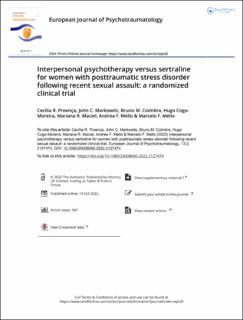| dc.contributor.author | Proença, Cecília R | |
| dc.contributor.author | Markowitz, John C. | |
| dc.contributor.author | Coimbra, Bruno M. | |
| dc.contributor.author | Cogo Moreira, Hugo | |
| dc.contributor.author | Maciel, Mariana R. | |
| dc.contributor.author | Mello, Andrea F. | |
| dc.contributor.author | Mello, Marcelo F. | |
| dc.date.accessioned | 2023-01-12T12:31:50Z | |
| dc.date.available | 2023-01-12T12:31:50Z | |
| dc.date.created | 2022-11-16T14:34:24Z | |
| dc.date.issued | 2022 | |
| dc.identifier.citation | European Journal of Psychotraumatology. 2022, 13 (2), Artikkel 2127474. | en_US |
| dc.identifier.issn | 2000-8066 | |
| dc.identifier.uri | https://hdl.handle.net/11250/3043043 | |
| dc.description.abstract | Background: Sexual assault often triggers posttraumatic stress disorder (PTSD), a potentially chronic severe mental disorder. Most guidelines recommend selective serotonin reuptake inhibitors (SSRIs) and trauma-focused psychotherapies as treatment options. Interpersonal Psychotherapy (IPT), adapted for PTSD (IPT-PTSD), focuses on interpersonal consequences of trauma rather than confronting the trauma itself. Studies have found IPT-PTSD efficaciously reduced PTSD symptoms with limited attrition. No efficacy trials have compared IPT-PTSD and SSRI. We hypothesized IPT would reduce PTSD, anxiety, and depressive symptoms more than sertraline among women with PTSD following a recent sexual assault.
Objectives: To compare the efficacy of IPT-PTSD to SSRI sertraline in a 14-week randomized clinical trial for women with PTSD following a recent sexual assault.
Methods: Seventy-four women with PTSD who had suffered sexual assault in the last six months were randomly assigned to 14 weeks of IPT-PTSD (n = 39) or sertraline (n = 35). Instruments assessed PTSD, anxiety, and depressive symptoms. This randomized clinical trial was conducted in São Paulo, Brazil, using the Clinician-Administered PTSD Scale-5 (CAPS-5) as the primary outcome measure.
Results: Both treatments significantly reduced PTSD, anxiety, and depressive symptoms, without between-group outcome differences. CAPS-5 mean decreased from 42.5 (SD = 9.4) to 27.1 (SD = 15.9) with sertraline and from 42.6 (SD = 9.1) to 29.1 (SD = 15.5) with IPT-PTSD. Attrition was high in both arms (p = .40).
Conclusions: This trial showed within-group improvements without differences between IPTPTSD and sertraline treatment of PTSD. Our findings suggest that non-exposure-based psychotherapies may benefit patients with PTSD, although we did not directly compare these treatments to an exposure therapy. Brazilian Clinical Trials Registry RBR-3z474z. | en_US |
| dc.language.iso | eng | en_US |
| dc.publisher | Taylor & Francis | en_US |
| dc.rights | Navngivelse-Ikkekommersiell 4.0 Internasjonal | * |
| dc.rights.uri | http://creativecommons.org/licenses/by-nc/4.0/deed.no | * |
| dc.subject | interpersonal psychotherapy | en_US |
| dc.subject | pharmacotherapy | en_US |
| dc.subject | sexual assault | en_US |
| dc.subject | posttraumatic stress disorder | en_US |
| dc.subject | treatment | en_US |
| dc.subject | clinical trial | en_US |
| dc.title | Interpersonal psychotherapy versus sertraline for women with posttraumatic stress disorder following recent sexual assault: a randomized clinical trial | en_US |
| dc.title.alternative | Psicoterapia interpersonal versus sertralina para mujeres con trastorno de estres postraumatico despues de un agresion sexual reciente: un estudio clinico aleatorizado | en_US |
| dc.type | Peer reviewed | en_US |
| dc.type | Journal article | en_US |
| dc.description.version | publishedVersion | en_US |
| dc.rights.holder | © 2022 The Author(s). | en_US |
| dc.subject.nsi | VDP::Medisinske Fag: 700::Klinisk medisinske fag: 750::Psykiatri, barnepsykiatri: 757 | en_US |
| dc.source.volume | 13 | en_US |
| dc.source.journal | European Journal of Psychotraumatology | en_US |
| dc.source.issue | 2 | en_US |
| dc.identifier.doi | 10.1080/20008066.2022.2127474 | |
| dc.identifier.cristin | 2074999 | |
| dc.source.articlenumber | 2127474 | en_US |
| cristin.ispublished | true | |
| cristin.fulltext | original | |
| cristin.qualitycode | 1 | |

